Fantastic, descriptive writing
We have been learning how to write descriptively. After exploring lots of vocabulary, the children went on to write some fantastic setting descriptions. They were asked to include good adjectives, to describe the nouns, prepositions and (of course) punctuate it all correctly.
Using a thesaurus, the class up levelled some of their chosen adjectives.
Here is an example of a setting description by Evie.
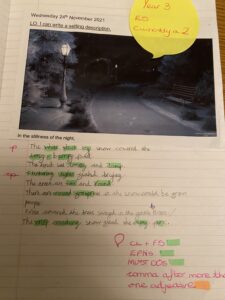
This week’s bible story
Today, we are thinking about Hanukah which is a Jewish festival. Have you ever been made to do something you didn’t want to do? In fact, you hated doing it?
How do you think David Beckham would feel if he had to do ballet? Or your headteacher if he or she had to dress up as a banana?
How do you think a Christian would feel if someone said to them at a Christmas nativity service, ‘You can’t worship Jesus, you’ve got to pray to the donkey?’
This is a story about when a whole country had to do things they didn’t want to, and how they reacted to it.
Reflection:
Quiet thought: How can you bring light to people today?
Prayer:
Dear God,
Thank you that your light burns even longer than we hope for.
Help us to be light to others.
Amen.
Week beginning 29 November 2021
Sorry that you can’t be in school this week. Below are lots of resources to keep your skills up. Don’t forget to e mail your class teacher if you have any problems.
Maths
Follow this sequence of maths learning which is linked to number and place value.
-
- Lesson 1: video, worksheet, answers
- Lesson 2: video, worksheet, answers
- Lesson 3: video, worksheet, answers
- Lesson 4: video, worksheet, answers
- Lesson 5: video, worksheet, answers
- Lesson 6: video, worksheet, answers
- Lesson 7: video, worksheet, answers
- Lesson 8: video, worksheet, answers
- Lesson 9: video, worksheet, answers
- Lesson 10: video, worksheet, answers
You don’t have to print the worksheet. Your child can write or draw their answers on paper. Your child’s learning will be most effective if you sit with them to pause the clip and check / praise / support your child as the clip moves on.
Practise times tables on Times Table Rockstars, too. Email the class teacher if you need your child’s login and password details.
(Suggested time: 30 minutes of Maths and 15 minutes of Rockstars daily)
Spelling
Look on the homework page to find this week’s spellings. They should choose some past spellings that they feel less confident with. Your child should complete one task each day.
- Day 1: Generate more words linked to the spelling pattern or ‘rule’. You could look out for the words in the book you’re reading at home, or any other text, like a website linked to our science topic of Living Things and their Habitat.
- Day 2: Practise the spellings using two of the ideas in our Super Spelling Strategies guide. (Set yourself and others at home a challenge of using some of the words when you’re speaking, too!)
- Day 3: Write separate sentences, each containing one of the spellings. (Don’t forget to show off really neat handwriting and make sure you sentence starts with a capital letter and ends with a full stop, exclamation mark (!) or question mark (?).
- Day 4: Repeat Task 2 or 3.
- Day 5: Get an adult at home to test you on your spellings. Practise any you spell incorrectly – you could write them out carefully until you’re sure.
(Suggested time: 15-20 minutes daily)
Reading fluency
This is the text we’re using in class this week to build up fluency skills.
In school, we generally follow this sequence:
- Day 1: Read the text aloud with your child listening. Read it clearly and slowly, pointing to each word as you read. Have a chat about any unfamiliar words.
- Day 2: Read aloud each sentence (a full short sentence or part of a longer sentence), and have your child read it back to you. Do this ‘echo reading’ for the whole text.
- Day 3: Read the text and talk about the effect of the punctuation on how you read it – pauses for full stops and expression for exclamations (!) or questions (?). Your child reads the text aloud.
- Day 4: Read together with expression (just like you practised on Day 3).
- Day 5: Your child reads independently and fluently.
(Suggested time: 15 minutes daily)
Reading comprehension
We’ll be using this RIC text in class to practise comprehension skills. RIC stands for:
- Retrieve: finding information in a text
- Interpret: using clues in the text to unlock information
- Choice: thinking about the author’s choice of words, techniques or organisation that make the text interesting and enjoyable to read
This half term we are reading Holes by Louis Sacher. He also wrote There’s a Boy in the Girl’s Bathroom. Follow these lessons on There’s a Boy in the Girls’ Bathroom and Charles Dicken’s A Christmas Carol. There’s a whole series of lessons, but start at Lesson 1 and work through, doing one (or maybe even two) each day. (If you’re self-isolating in your second week, stick with the series of lessons you’ve already started and aim to complete the full series.)
(Suggested time: 30 minutes daily)
Writing
Follow these lessons on Shaun Tan’s The Viewer There’s a whole series of lessons, but start at Lesson 1 and work through, doing one (or maybe even two) each day. (If you’re self-isolating in your second week, stick with the series of lessons you’ve already started and aim to complete the full series.)
(Suggested time: 30-40 minutes for each)
Topic
Our topic this half-term is art.
Choose an area of art which interests you from Oak Academy. Follow the lesson sequence. They each have 5 lessons so you could do two a week.
(Suggested time: 30-40 minutes)
Science
Our focus this half-term is light.
These six lessons from Oak National Academy link closely to what we’ve been doing in class. Start at Lesson 1 and work through, doing two or three in the week. If you’ve previously completed one of these lessons, have a go at the ones you haven’t completed yet.
If Science really motivates your child, you could also use look at these lessons all about practical Science.
(Suggested time: 30-45 minutes)
PE
Don’t forget to do some daily exercise!
Do two or three of these Five Minute Moves from Joe Wicks each day – spread them across the day as if they were playtimes, maybe!
Try working through this series of 25 lessons from the Association for Physical Education – do two or three in the week.
(Suggested time: 5 minutes daily, plus 30 minutes for the longer PE lessons)
Extra stuff…
As an extra (or as an alternative, if this helps to motivate your child)…
Geography isn’t a topic-driver this half-term, but you could brush up on your locational knowledge – something that was missed when schools closed earlier this year. You could explore some online maps and try to memorise some new countries, capitals, rivers and mountain ranges. These three lessons about Europe are worth checking out.
What about some Living and Learning? While you’re away from school, you could check out these lessons on money!
Week beginning 29 November 2021
Sorry that you can’t be in school this week. Below are lots of resources to keep your skills up. Don’t forget to e mail your class teacher if you have any problems.
Maths
Follow this sequence of maths learning which is linked to number and place value.
- Lesson 1: video, worksheet, answers
- Lesson 2: video, worksheet, answers
- Lesson 3: video, worksheet, answers
- Lesson 4: video, worksheet, answers
- Lesson 5: video, worksheet, answers
- Lesson 6: video, worksheet, answers
- Lesson 7: video, worksheet, answers
- Lesson 8: video, worksheet, answers
- Lesson 9: video, worksheet, answers
- Lesson 10: video, worksheet, answers
You don’t have to print the worksheet. Your child can write or draw their answers on paper. Your child’s learning will be most effective if you sit with them to pause the clip and check / praise / support your child as the clip moves on.
Practise times tables on Times Table Rockstars, too. Email the class teacher if you need your child’s login and password details.
(Suggested time: 30 minutes of Maths and 15 minutes of Rockstars daily)
Spelling
Look on the homework page to find this week’s spellings. They should choose some past spellings that they feel less confident with. Your child should complete one task each day.
- Day 1: Generate more words linked to the spelling pattern or ‘rule’. You could look out for the words in the book you’re reading at home, or any other text, like a website linked to our science topic of Living Things and their Habitat.
- Day 2: Practise the spellings using two of the ideas in our Super Spelling Strategies guide. (Set yourself and others at home a challenge of using some of the words when you’re speaking, too!)
- Day 3: Write separate sentences, each containing one of the spellings. (Don’t forget to show off really neat handwriting and make sure you sentence starts with a capital letter and ends with a full stop, exclamation mark (!) or question mark (?).
- Day 4: Repeat Task 2 or 3.
- Day 5: Get an adult at home to test you on your spellings. Practise any you spell incorrectly – you could write them out carefully until you’re sure.
(Suggested time: 15-20 minutes daily)
Reading fluency
This is the text we’re using in class this week to build up fluency skills.
In school, we generally follow this sequence:
- Day 1: Read the text aloud with your child listening. Read it clearly and slowly, pointing to each word as you read. Have a chat about any unfamiliar words.
- Day 2: Read aloud each sentence (a full short sentence or part of a longer sentence), and have your child read it back to you. Do this ‘echo reading’ for the whole text.
- Day 3: Read the text and talk about the effect of the punctuation on how you read it – pauses for full stops and expression for exclamations (!) or questions (?). Your child reads the text aloud.
- Day 4: Read together with expression (just like you practised on Day 3).
- Day 5: Your child reads independently and fluently.
(Suggested time: 15 minutes daily)
Reading comprehension
We’ll be using this RIC text in class to practise comprehension skills. RIC stands for:
- Retrieve: finding information in a text
- Interpret: using clues in the text to unlock information
- Choice: thinking about the author’s choice of words, techniques or organisation that make the text interesting and enjoyable to read
This half term we are reading Holes by Louis Sacher. He also wrote There’s a Boy in the Girl’s Bathroom. Follow these lessons on There’s a Boy in the Girls’ Bathroom and Charles Dicken’s A Christmas Carol. There’s a whole series of lessons, but start at Lesson 1 and work through, doing one (or maybe even two) each day. (If you’re self-isolating in your second week, stick with the series of lessons you’ve already started and aim to complete the full series.)
(Suggested time: 30 minutes daily)
Writing
Follow these lessons on Shaun Tan’s The Viewer There’s a whole series of lessons, but start at Lesson 1 and work through, doing one (or maybe even two) each day. (If you’re self-isolating in your second week, stick with the series of lessons you’ve already started and aim to complete the full series.)
(Suggested time: 30-40 minutes for each)
Topic
Our topic this half-term is art.
Choose an area of art which interests you from Oak Academy. Follow the lesson sequence. They each have 5 lessons so you could do two a week.
(Suggested time: 30-40 minutes)
Science
Our focus this half-term is light.
These six lessons from Oak National Academy link closely to what we’ve been doing in class. Start at Lesson 1 and work through, doing two or three in the week. If you’ve previously completed one of these lessons, have a go at the ones you haven’t completed yet.
If Science really motivates your child, you could also use look at these lessons all about practical Science.
(Suggested time: 30-45 minutes)
PE
Don’t forget to do some daily exercise!
Do two or three of these Five Minute Moves from Joe Wicks each day – spread them across the day as if they were playtimes, maybe!
Try working through this series of 25 lessons from the Association for Physical Education – do two or three in the week.
(Suggested time: 5 minutes daily, plus 30 minutes for the longer PE lessons)
Extra stuff…
As an extra (or as an alternative, if this helps to motivate your child)…
Geography isn’t a topic-driver this half-term, but you could brush up on your locational knowledge – something that was missed when schools closed earlier this year. You could explore some online maps and try to memorise some new countries, capitals, rivers and mountain ranges. These three lessons about Europe are worth checking out.
What about some Living and Learning? While you’re away from school, you could check out these lessons on money!
Week beginning 29 November 2021
Hi everyone
We hope you’re feeling happy and healthy at home. We miss having you in school but we want you to know that you’re still very much part of our school community. Enjoy your home learning for this week.
Maths
Follow this sequence of maths learning which is linked to multiplication and division.
- Lesson 1: video, worksheet, answers
- Lesson 2: video, worksheet, answers
- Lesson 3: video, worksheet, answers
- Lesson 4: video, worksheet, answers
- Lesson 5: video, worksheet, answers
- Lesson 6: video, worksheet, answers
- Lesson 7: video, worksheet, answers
- Lesson 8: video, worksheet, answers
- Lesson 9: video, worksheet, answers
- Lesson 10: video, worksheet, answers
You don’t have to print the worksheet. Your child can write or draw their answers on paper. Your child’s learning will be most effective if you sit with them to pause the clip and check / praise / support your child as the clip moves on.
Practise times tables on Times Table Rockstars, too. If your child is in Y3, we’re concentrating on the 8 times table. If your child is in Y4, we’re concentrating on all times tables up to and including 12 x 12. Email the class teacher if you need your child’s login and password details.
(Suggested time: 30 minutes of Maths and 15 minutes of Rockstars daily)
Spelling
Look on the homework page to find this week’s spellings. They should choose some past spellings that they feel less confident with. Your child should complete one task each day.
- Day 1: Generate more words linked to the spelling pattern or ‘rule’. You could look out for the words in the book you’re reading at home, or any other text, like a website linked to our science topic of Living Things and their Habitat.
- Day 2: Practise the spellings using two of the ideas in our Super Spelling Strategies guide. (Set yourself and others at home a challenge of using some of the words when you’re speaking, too!)
- Day 3: Write separate sentences, each containing one of the spellings. (Don’t forget to show off really neat handwriting and make sure you sentence starts with a capital letter and ends with a full stop, exclamation mark (!) or question mark (?).
- Day 4: Repeat Task 2 or 3.
- Day 5: Get an adult at home to test you on your spellings. Practise any you spell incorrectly – you could write them out carefully until you’re sure.
(Suggested time: 15-20 minutes daily)
Reading fluency
This is the text we’re using in class this week to build up fluency skills.
In school, we generally follow this sequence:
- Day 1: Read the text aloud with your child listening. Read it clearly and slowly, pointing to each word as you read. Have a chat about any unfamiliar words.
- Day 2: Read aloud each sentence (a full short sentence or part of a longer sentence), and have your child read it back to you. Do this ‘echo reading’ for the whole text.
- Day 3: Read the text and talk about the effect of the punctuation on how you read it – pauses for full stops and expression for exclamations (!) or questions (?). Your child reads the text aloud.
- Day 4: Read together with expression (just like you practised on Day 3).
- Day 5: Your child reads independently and fluently.
(Suggested time: 15 minutes daily)
Reading comprehension
We’ll be using this RIC text in class to practise comprehension skills by answering these questions. RIC stands for:
- Retrieve: finding information in a text
- Interpret: using clues in the text to unlock information
- Choice: thinking about the author’s choice of words, techniques or organisation that make the text interesting and enjoyable to read
Follow these lessons from Oak National Academy. There’s a whole series of lessons, but start at Lesson 1 and work through, doing one (or maybe even two) each day. (If you’re self-isolating in your second week, stick with the series of lessons you’ve already started and aim to complete the full series.)
(Suggested time: 30 minutes daily)
Writing
Follow these lessons from Oak National Academy. There’s a whole series of lessons, but start at Lesson 1 and work through, doing one (or maybe even two) each day. (If you’re self-isolating in your second week, stick with the series of lessons you’ve already started and aim to complete the full series.)
(Suggested time: 30-40 minutes for each)
Topic
Our topic this half-term is about art.
Follow these lessons from Oak National Academy. There’s a whole series of lessons, but start at Lesson 1 and work through, doing one (or maybe even two) each day. (If you’re self-isolating in your second week, stick with the series of lessons you’ve already started and aim to complete the full series.)
(Suggested time: 30-40 minutes)
Science
Our focus this half-term is about light.
These six lessons from Oak National Academy link closely to what we’ve been doing in class. Start at Lesson 1 and work through, doing two or three in the week. If you’ve previously completed on of these lessons, have a go at the ones you haven’t completed yet.
If Science really motivates your child, you could also use look at these lessons all about practical Science.
(Suggested time: 30-45 minutes)
PE
Don’t forget to do some daily exercise!
Do two or three of these Five Minute Moves from Joe Wicks each day – spread them across the day as if they were playtimes, maybe!
Try working through this series of 25 lessons from the Association for Physical Education – do two or three in the week.
(Suggested time: 5 minutes daily, plus 30 minutes for the longer PE lessons)
Extra stuff…
As an extra (or as an alternative, if this helps to motivate your child)…
Fancy learning about a new religion? You don’t have to be religious to learn about, and appreciate, religions from all around the world. Check out this set of lessons from Oak National Academy – you could choose to focus on one religion or dip into each set for an overview.
What about some Living and Learning? While you’re away from school, you could check out these lessons on keeping safe!
Week beginning 29 November 2021
Hi everyone
We hope you’re feeling happy and healthy at home. We miss having you in school but we want you to know that you’re still very much part of our school community. Enjoy your home learning for this week.
Maths
Follow this sequence of maths learning which is linked to multiplication and division.
- Lesson 1: video, worksheet, answers
- Lesson 2: video, worksheet, answers
- Lesson 3: video, worksheet, answers
- Lesson 4: video, worksheet, answers
- Lesson 5: video, worksheet, answers
- Lesson 6: video, worksheet, answers
- Lesson 7: video, worksheet, answers
- Lesson 8: video, worksheet, answers
- Lesson 9: video, worksheet, answers
- Lesson 10: video, worksheet, answers
You don’t have to print the worksheet. Your child can write or draw their answers on paper. Your child’s learning will be most effective if you sit with them to pause the clip and check / praise / support your child as the clip moves on.
Practise times tables on Times Table Rockstars, too. If your child is in Y3, we’re concentrating on the 8 times table. If your child is in Y4, we’re concentrating on all times tables up to and including 12 x 12. Email the class teacher if you need your child’s login and password details.
(Suggested time: 30 minutes of Maths and 15 minutes of Rockstars daily)
Spelling
Look on the homework page to find this week’s spellings. They should choose some past spellings that they feel less confident with. Your child should complete one task each day.
- Day 1: Generate more words linked to the spelling pattern or ‘rule’. You could look out for the words in the book you’re reading at home, or any other text, like a website linked to our science topic of Living Things and their Habitat.
- Day 2: Practise the spellings using two of the ideas in our Super Spelling Strategies guide. (Set yourself and others at home a challenge of using some of the words when you’re speaking, too!)
- Day 3: Write separate sentences, each containing one of the spellings. (Don’t forget to show off really neat handwriting and make sure you sentence starts with a capital letter and ends with a full stop, exclamation mark (!) or question mark (?).
- Day 4: Repeat Task 2 or 3.
- Day 5: Get an adult at home to test you on your spellings. Practise any you spell incorrectly – you could write them out carefully until you’re sure.
(Suggested time: 15-20 minutes daily)
Reading fluency
This is the text we’re using in class this week to build up fluency skills.
In school, we generally follow this sequence:
- Day 1: Read the text aloud with your child listening. Read it clearly and slowly, pointing to each word as you read. Have a chat about any unfamiliar words.
- Day 2: Read aloud each sentence (a full short sentence or part of a longer sentence), and have your child read it back to you. Do this ‘echo reading’ for the whole text.
- Day 3: Read the text and talk about the effect of the punctuation on how you read it – pauses for full stops and expression for exclamations (!) or questions (?). Your child reads the text aloud.
- Day 4: Read together with expression (just like you practised on Day 3).
- Day 5: Your child reads independently and fluently.
(Suggested time: 15 minutes daily)
Reading comprehension
We’ll be using this RIC text in class to practise comprehension skills by answering these questions. RIC stands for:
- Retrieve: finding information in a text
- Interpret: using clues in the text to unlock information
- Choice: thinking about the author’s choice of words, techniques or organisation that make the text interesting and enjoyable to read
Follow these lessons from Oak National Academy. There’s a whole series of lessons, but start at Lesson 1 and work through, doing one (or maybe even two) each day. (If you’re self-isolating in your second week, stick with the series of lessons you’ve already started and aim to complete the full series.)
(Suggested time: 30 minutes daily)
Writing
Follow these lessons from Oak National Academy. There’s a whole series of lessons, but start at Lesson 1 and work through, doing one (or maybe even two) each day. (If you’re self-isolating in your second week, stick with the series of lessons you’ve already started and aim to complete the full series.)
(Suggested time: 30-40 minutes for each)
Topic
Our topic this half-term is about art.
Follow these lessons from Oak National Academy. There’s a whole series of lessons, but start at Lesson 1 and work through, doing one (or maybe even two) each day. (If you’re self-isolating in your second week, stick with the series of lessons you’ve already started and aim to complete the full series.)
(Suggested time: 30-40 minutes)
Science
Our focus this half-term is about light.
These six lessons from Oak National Academy link closely to what we’ve been doing in class. Start at Lesson 1 and work through, doing two or three in the week. If you’ve previously completed on of these lessons, have a go at the ones you haven’t completed yet.
If Science really motivates your child, you could also use look at these lessons all about practical Science.
(Suggested time: 30-45 minutes)
PE
Don’t forget to do some daily exercise!
Do two or three of these Five Minute Moves from Joe Wicks each day – spread them across the day as if they were playtimes, maybe!
Try working through this series of 25 lessons from the Association for Physical Education – do two or three in the week.
(Suggested time: 5 minutes daily, plus 30 minutes for the longer PE lessons)
Extra stuff…
As an extra (or as an alternative, if this helps to motivate your child)…
Fancy learning about a new religion? You don’t have to be religious to learn about, and appreciate, religions from all around the world. Check out this set of lessons from Oak National Academy – you could choose to focus on one religion or dip into each set for an overview.
What about some Living and Learning? While you’re away from school, you could check out these lessons on keeping safe!
A magical week!
Our two focus books for this week have been: ‘Jack and the Beanstalk’ and ‘The Magic Porridge Pot’. The children have really enjoyed listening to these stories and we have used them as inspiration for our learning. Today, we took a ‘magic carpet ride’ with our wands and pretended to fly over the tops of the houses in Wetherby. We took an imaginary trip to the seaside, talked about what we would see if we visited some penguins and listed all of the animals we could visit on a farm. The children are becoming incredibly good storytellers and they all enjoyed suggesting places we could fly to on our imaginary journey. Earlier in the week, we used the lightbox to create different colours by overlapping transparent shapes and we made paperclips dance using magnets. We’ve also done some magical maths where we compared the height and size of different objects. We hope that the magic beans we planted will grow into a beanstalk but, just in case, we have created some of our own!
Next week, we will start celebrating Advent and we will begin thinking about the Christmas story.
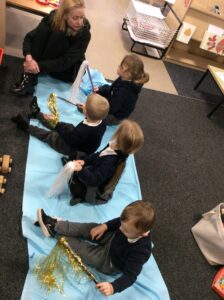
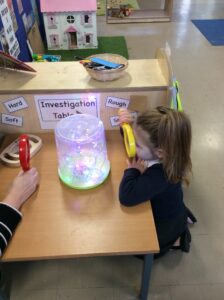
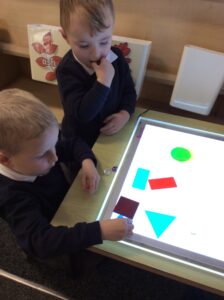
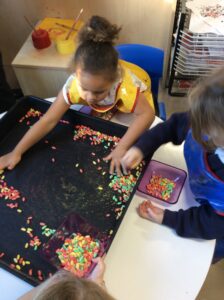
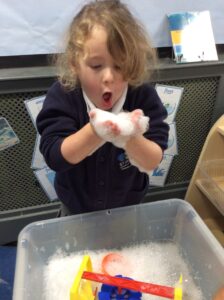
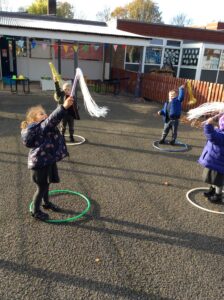
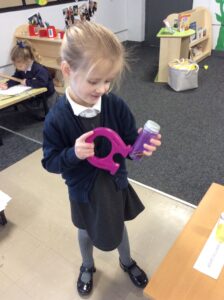
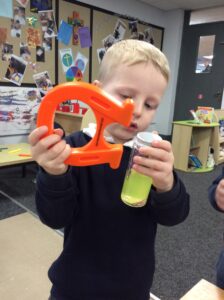
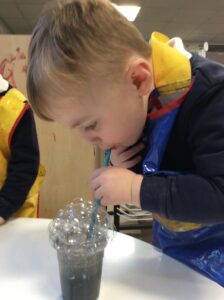
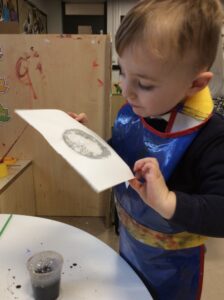
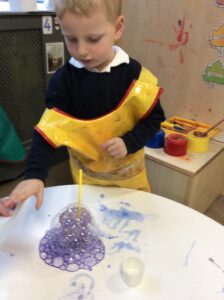
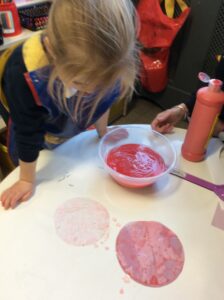
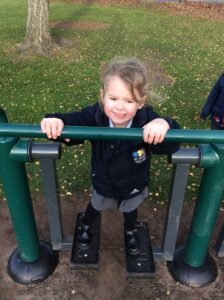
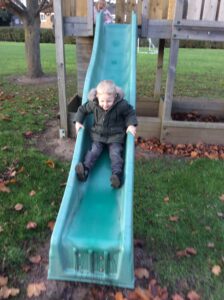
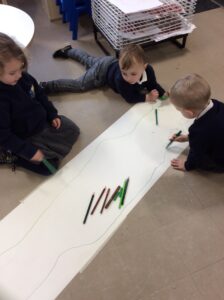

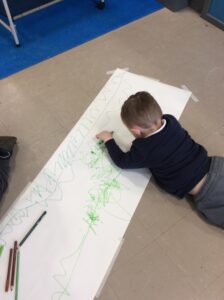
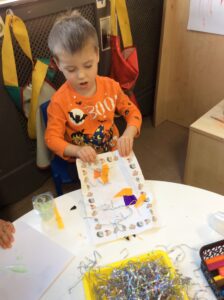
Week beginning 29 November 2021
We hope you’re managing to stay happy, healthy and safe while you’re not with us here in school. You are still very much a part of our school community so please get in touch with us if you need to.
Maths
Have a go at these maths lessons and worksheets.
- Lesson 1 video, worksheet and answers.
- Lesson 2 video, worksheet and answers.
- Lesson 3 video, worksheet and answers.
- Lesson 4 video, worksheet and answers.
- Lesson 5 – watch the Supermovers video about counting in 5s and the 5 times table. Write down all the fives, as high as you can go (0, 5, 10, 15, 20, 25…).
- Lesson 6 video, worksheet and answers.
- Lesson 7 video, worksheet and answers.
- Lesson 8 video, worksheet and answers.
- Lesson 9 video, worksheet and answers.
- Lesson 10 video, worksheet and answers.
You don’t have to print the worksheets. Your child can write or draw their answers on paper. Your child’s learning will be most effective if you sit with them to pause the clip and check / praise / support your child as the clip moves on.
Don’t forget to practise number bonds on Numbots or times tables on Times Table Rock Stars. Email your child’s class teacher if you need your login and password details.
(Suggested time: 30 minutes of Maths and 15 minutes of Numbots/Rock Stars daily)
Reading fluency
This is the reading fluency that we’ll read in class this week. In school, we generally follow this sequence:
- Day 1: Read the text aloud with your child listening. Read it clearly and slowly, pointing to each word as you read. Have a chat about any unfamiliar words.
- Day 2: Read aloud each sentence (a full short sentence or part of a longer sentence), and have your child read it back to you. Do this ‘echo reading’ for the whole text.
- Day 3: Read the text and talk about the effect of the punctuation on how you read it – pauses for full stops and expression for exclamations (!) or questions (?). Your child reads the text aloud.
- Day 4: Read together with expression (just like you practised on Day 3).
- Day 5: Your child reads independently and fluently.
(Suggested time: 15 minutes daily)
Phonics
We teach a phonics lesson daily at school. Your child should have a ‘Practise Phonics’ book that they bring home from school. The sticker on the front will indicate which phase they’re working at. On Phonics Play, the activities and games match the phases. If you’re unsure which phase your child is working on, email your class teacher.
If your child has completed the phonics reading books, they can use some Phase 5b, 5c, 5d or Phase 6 resources.
Use a different Phonics Play activity for :
- Revisit: Flashcard Speed Trial, Flashcard Time Challenge or Tricky Word Trucks
- Practise: Play Buried Treasure, Dragon’s Den or Picnic on Pluto
- Apply: Have a go reading one of the Comics or the Reading Robots
Login details are Sphere (user name) and Spher3 (password).
(Suggested time: 20 minutes daily)
Reading
We’ll be using this ’RIC’ text in class to practise comprehension skills.
RIC stands for:
- Retrieve: finding information in a text
- Interpret: using clues in the text or pictures to unlock information
- Choice: thinking about the author’s choice of words, techniques or organisation that make the text interesting and enjoyable to read
Read for 10-15 minutes daily. You could read the books you have brought home from school or any other books you have at home. Remember that the ‘Practise Phonics’ book is designed to be read more than once, to help with segmenting (sounding out), blending (putting the sounds back together) and fluency.
(Suggested time: 10-15 minutes daily)
Writing
These writing lessons all about non-chronological reports. There’s a whole series of lessons, but start at Lesson 1 and work through, doing one (or maybe even two) each day. (If you’re self-isolating in your second week, stick with the series of lessons you’ve already started and aim to complete the full series.)
(Suggested time: 30-40 minutes for each)
Spelling
This week’s spellings are on our spelling page. Complete one task each day:
- Day 1: Copy the words out in your best handwriting (like in our handwriting guide) – using a lead-in line or joined handwriting. (You could look out for the words in the book you’re reading at home, or any other text.)
- Day 2: Practise the spellings using two of the ideas in our super spelling strategies guide. (Set yourself and others at home a challenge of using some of the words when you’re speaking, too!)
- Day 3: Write separate sentences, each containing one of the spellings. (Don’t forget to show off really neat handwriting and make sure you sentence starts with a capital letter and ends with a full stop, exclamation mark (!) or question mark (?).
- Day 4: Repeat Task 2 or 3.
- Day 5: Get an adult at home to test you on your spellings. Practise any you spell incorrectly – you could write them out carefully until you’re sure.
(Suggested time: 15-20 minutes daily)
Topic
Our topic this half-term is art. Look at these lessons on printing. Or you can get creative using ideas from The Let’s Go Club on the BBC.
(Suggested time: 30-40 minutes)
Science
Our science lessons are all about investigating. Have a go at these six lessons. Start at Lesson 1 and work through, doing two or three in the week.
(Suggested time: 30-45 minutes)
PE
Don’t forget to do some daily exercise!
Do two of these Five Minute Moves from Joe Wicks each day – spread them across the day as if they were playtimes, maybe!
Have a go at one of the Change for Life indoor activities or a Cosmic Kids yoga session each day.
(Suggested time: 30 minutes daily)
Extra stuff…
As an extra (or as an alternative, if this helps to motivate your child)…
This sequence of lessons is all about The Nativity story.
Living and Learning is important to help us live and learn together. Here are some lesson from Oak National Academy called Forever Friends.
Week beginning 29 November 2021
We hope you’re managing to stay happy, healthy and safe while you’re not with us here in school. You are still very much a part of our school community so please get in touch with us if you need to.
Maths
Have a go at these maths lessons and worksheets.
- Lesson 1 video, worksheet and answers.
- Lesson 2 video, worksheet and answers.
- Lesson 3 video, worksheet and answers.
- Lesson 4 – watch the Supermovers video about counting in 2s and the 2 times table. Write down all the twos, as high as you can go (0, 5, 10, 15, 20, 25…). Challenge : write the 2 times table facts.
- Lesson 5 – watch the Supermovers video about counting in 5s and the 5 times table. Write down all the fives, as high as you can go (0, 5, 10, 15, 20, 25…). Challenge : write the 5 times table facts.
- Lesson 6 video, worksheet and answers.
- Lesson 7 video, worksheet and answers.
- Lesson 8 video, worksheet and answers.
- Lesson 9 video, worksheet and answers.
- Lesson 10 video and activities.
You don’t have to print the worksheets. Your child can write or draw their answers on paper. Your child’s learning will be most effective if you sit with them to pause the clip and check / praise / support your child as the clip moves on.
Don’t forget to practise number bonds on Numbots or times tables on Times Table Rock Stars. Email your child’s class teacher if you need your login and password details.
(Suggested time: 30 minutes of Maths and 15 minutes of Numbots/Rock Stars daily)
Reading fluency
This is the reading fluency that we’ll read in class this week. In school, we generally follow this sequence:
- Day 1: Read the text aloud with your child listening. Read it clearly and slowly, pointing to each word as you read. Have a chat about any unfamiliar words.
- Day 2: Read aloud each sentence (a full short sentence or part of a longer sentence), and have your child read it back to you. Do this ‘echo reading’ for the whole text.
- Day 3: Read the text and talk about the effect of the punctuation on how you read it – pauses for full stops and expression for exclamations (!) or questions (?). Your child reads the text aloud.
- Day 4: Read together with expression (just like you practised on Day 3).
- Day 5: Your child reads independently and fluently.
(Suggested time: 15 minutes daily)
Phonics
We teach a phonics lesson daily at school. Your child should have a ‘Practise Phonics’ book that they bring home from school. The sticker on the front will indicate which phase they’re working at. On Phonics Play, the activities and games match the phases. If you’re unsure which phase your child is working on, email your class teacher.
If your child has completed the phonics reading books, they can use some Phase 5b, 5c, 5d or Phase 6 resources.
Use a different Phonics Play activity for :
- Revisit: Flashcard Speed Trial, Flashcard Time Challenge or Tricky Word Trucks
- Practise: Play Buried Treasure, Dragon’s Den or Picnic on Pluto
- Apply: Have a go reading one of the Comics or the Reading Robots
Login details are Sphere (user name) and Spher3 (password).
(Suggested time: 20 minutes daily)
Reading
We’ll be using this ’RIC’ text in class to practise comprehension skills.
RIC stands for:
- Retrieve: finding information in a text
- Interpret: using clues in the text or pictures to unlock information
- Choice: thinking about the author’s choice of words, techniques or organisation that make the text interesting and enjoyable to read
Read for 10-15 minutes daily. You could read the books you have brought home from school or any other books you have at home. Remember that the ‘Practise Phonics’ book is designed to be read more than once, to help with segmenting (sounding out), blending (putting the sounds back together) and fluency.
(Suggested time: 10-15 minutes daily)
Writing
These writing lessons all about non-chronological reports. There’s a whole series of lessons, but start at Lesson 1 and work through, doing one (or maybe even two) each day. (If you’re self-isolating in your second week, stick with the series of lessons you’ve already started and aim to complete the full series.)
(Suggested time: 30-40 minutes for each)
Spelling
This week’s spellings are on our spelling page. Complete one task each day:
- Day 1: Copy the words out in your best handwriting (like in our handwriting guide) – using a lead-in line or joined handwriting. (You could look out for the words in the book you’re reading at home, or any other text.)
- Day 2: Practise the spellings using two of the ideas in our super spelling strategies guide. (Set yourself and others at home a challenge of using some of the words when you’re speaking, too!)
- Day 3: Write separate sentences, each containing one of the spellings. (Don’t forget to show off really neat handwriting and make sure you sentence starts with a capital letter and ends with a full stop, exclamation mark (!) or question mark (?).
- Day 4: Repeat Task 2 or 3.
- Day 5: Get an adult at home to test you on your spellings. Practise any you spell incorrectly – you could write them out carefully until you’re sure.
(Suggested time: 15-20 minutes daily)
Topic
Our topic this half-term is art. Look at these lessons on printing. Or you can get creative using ideas from The Let’s Go Club on the BBC.
(Suggested time: 30-40 minutes)
Science
Our science lessons are all about investigating. Have a go at these six lessons. Start at Lesson 1 and work through, doing two or three in the week.
(Suggested time: 30-45 minutes)
PE
Don’t forget to do some daily exercise!
Do two of these Five Minute Moves from Joe Wicks each day – spread them across the day as if they were playtimes, maybe!
Have a go at one of the Change for Life indoor activities or a Cosmic Kids yoga session each day.
(Suggested time: 30 minutes daily)
Extra stuff…
As an extra (or as an alternative, if this helps to motivate your child)…
This sequence of lessons is all about The Nativity story.
Living and Learning is important to help us live and learn together. Here are some lesson from Oak National Academy called Forever Friends.
This week’s message (Friday 26 November 2021)
This week’s message comes from Paula Allaway, who’s the Maths Leader across Sphere Federation…
Is your child engaging with the number fact fluency homework?
Number fact fluency – the quick recall of addition and subtraction facts, and multiplication and division facts (times tables), is really important for all children. The ability to recall these facts quickly (rather than taking too long working them out) helps children to answer questions in lots of areas of Maths much more easily.
If these facts are learnt and stored, rather than being calculated or counted, they require less activity from the brain. Essentially, memorisation frees up working memory space to allow children to focus on learning new mathematical ideas and applying mathematics to solve problems, and not the facts themselves.
Addition and subtraction facts
For younger children, the crucial numbers facts are simple addition and subtraction facts. We want children to know facts like bonds of ten (eg 3+7 and 4+6) without having to count on or back using their fingers. How fluent are your child’s number facts? Regularly accessing NumBots will help with this.
Multiplication and division facts
For older children, number facts also includes times tables up to 12 x 12. By the end of Year 4, children should know their times tables without having to count through to reach the answer. Times Tables Rock Stars will help with this. In June 2022, Y4 children will take part in a statutory national assessment – the Multiplication Tables Check. They’ll be tested on 25 randomly selected facts.
Without secure knowledge of times tables facts, many future Maths topics are more difficult to learn. In Y5,6, for example, progress in column methods, fractions, area, ratio and proportion can all be hampered because they involve recall of facts.
Children who do well in our assessments are the children who are spending more time practising on NumBots and Rock Stars. Likewise, the children who need to learn these facts more aren’t using this resource at home.
We know that being fluent with number facts leads to high confidence in maths generally. To support this, we’ve slimmed back what we ask for homework to help make sure our children’s Maths (and also Reading) skills are strong. Your child should spend about 10 minutes practising number facts each day. Look out for the focus on the homework sheet we send home.
If you need help accessing these, please contact your child’s class teacher.